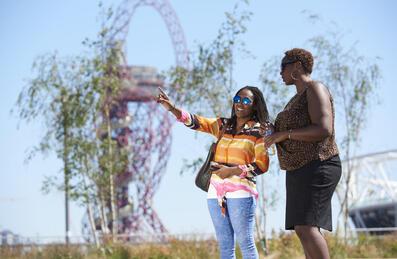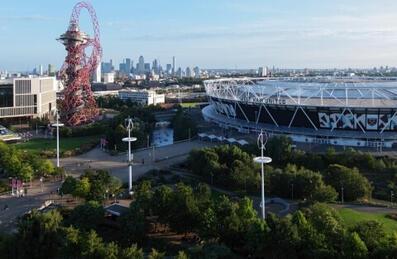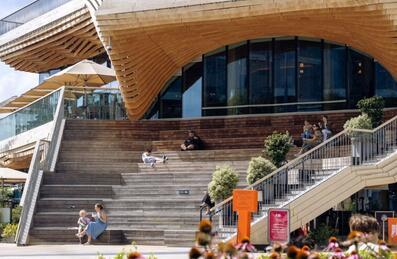
Popular Searches:
Keep up to date
Sign up today for exclusive offers and incredible experiences you won’t want to miss at Queen Elizabeth Olympic Park.
Sign up nowINTERNATIONAL OLYMPIC COMMITTEE HAIL LONDON AS LEGACY BLUEPRINT
INTERNATIONAL OLYMPIC COMMITTEE HAIL LONDON AS LEGACY BLUEPRINT
Press Release 28/03/2012
International Olympic Committee (IOC) President Jacques Rogge has hailed London 2012 as a “legacy blueprint” for future Olympic Games ahead of a meeting today with Prime Minister David Cameron, Culture Secretary Jeremy Hunt, LOCOG Chairman Lord Coe and Sports Minister Hugh Robertson.
The high level endorsement coincides with the IOC’s three-day inspection visit and the publication of the Government’s new legacy blueprint, “Beyond 2012” – which sets out for the first time the breadth and depth of the sporting, economic, regeneration and community legacy that will be delivered after the 2012 Olympic and Paralympic Games.
President Rogge will meet the Prime Minister in Downing Street to hear where London’s preparations are, and how the Government is helping to deliver not just a great Games, but also a real and lasting legacy. He will also be introduced to the new official Sainsbury’s School Games Ambassadors – Olympians Denise Lewis, Darren Campbell and Jason Gardener, and Paralympian Ellie Simmonds.
David Cameron said:
“Legacy has been built into the DNA of London 2012. But by definition, of course, the true legacy of London 2012 lies in the future. Though much has been done, I am acutely aware that the drive to embed and secure the benefits of London 2012 is still to come. That is our biggest challenge. It’s also our greatest opportunity.”
Jacques Rogge said:
“London has raised the bar on how to deliver a lasting legacy. We can already see tangible results in the remarkable regeneration of East London. This great historical city has created a legacy blueprint for future Games hosts.”
Seb Coe said:
“London 2012 will be a summer of sport and celebration like no other. But it will only be the start of the journey. My dream is that millions of young people, here and overseas, will witness the achievements of the finest sportspeople on the planet and be inspired to take up sport for themselves.”
Andrew Altman, Chief Executive of the Olympic Park Legacy Company, said:
“Legacy plans are more advanced than any previous Olympic host city. We are on track to build a new piece of the city in East London and over the next 20 years deliver an exciting mix of new homes, jobs and training, along with sporting, cultural and entertainment opportunities. London has set the benchmark for using the Games as a catalyst for regeneration.”
There is no complacency amongst Games organisers, and there remains a huge amount to deliver before 27 July. But, as the IOC President Rogge makes clear, the UK is setting the international legacy standard for all other bidding cities. The key aspects of London’s legacy – as set out in today’s new document – are:
- The concept of legacy has been built into everything we have done from the outset.
- Sport: A sporting legacy was at the core of London’s Olympic bid, and remains the heartbeat of our Games legacy. From grassroots to elite level, across schools, sports centres and community venues throughout the country, we want to ignite a new passion for sport across all age groups, and particularly among young people. This includes:
- A £500 million boost to sport through Government Lottery reforms, helping to support: a £1 billion youth and community sport strategy targeting 15-24 year olds; a £135 million Places People Play programme to improve the nation’s sport facilities and infrastructure; and maintaining investment in elite performance in the lead up to Rio 2016.
- The Sainsbury’s School Games competition re-energising competitive sport in schools, with more than 12,000 schools now signed up, culminating in national finals on the Olympic Park in May.
- Operators in place for six out of eight Olympic Park venues beyond 2012, helping to ensure no white elephants left behind after the Games.
- More than 12 million young people across 20 countries reached through the International Inspiration programme, using sport to improve lives and change societies around the world.
- Economic growth: The preparations for London 2012 coincided with the worst global economic crisis since the Second World War. Despite the economic conditions, the Government maintained its investment in the Games. In return, London 2012 is now helping support the UK’s recovery. This includes:
- The ground-breaking Olympic Park providing a showcase for UK construction expertise, with 98 per cent of Olympic Park contracts going to UK-based companies, and more than 10,000 business opportunities made available through the CompeteFor brokerage service set up for the Games.
- Ninety-four per cent of LOCOG contracts won by UK businesses, adding a further £900 million to the economy.
- A £3 billion economic boost expected in the years after London 2012 through domestic and global tourism campaigns, and Games-related trade and investment activity.
- All of this anchored by the new cross-Government GREAT advertising and marketing activity, which 90 million people will see worldwide during the campaign.
- People: From the Olympic Torch journeying across the country to Britain’s biggest ever cultural festival taking place over the summer, and not forgetting a nationwide programme of community projects inspired by London 2012, everyone can be part of the experience – not only creating some wonderful memories, but changing many thousands of lives forever. This includes:
- Supporting a new culture of volunteering, with 70,000 Games Makers and 8,000 Team London Ambassadors giving up their time to work directly on staging London 2012, and millions around the country getting involved in the Cultural Olympiad, the Torch Relay and the 2,000 community action projects inspired by London 2012.
- Changing attitudes to disabled people, through ground-breaking TV coverage and strong corporate support for the Paralympics, and various community, cultural and sporting programmes to engage and involve disabled people in all aspects of planning and delivery of the Games.
- East London: The social, sporting and economic benefits of the Games are being felt across the country, but nowhere more so than in East London. This includes:
- Urban regeneration at a pace and scale never attempted before, with the impetus provided by London 2012 supporting long term regeneration plans developed by host boroughs and London Mayor.
- The major share of the £6.5 billion in transport upgrades focused on East London – turning one of the worst connected parts of the capital into one of the best, including £200 million upgrade to Stratford Regional Station.
- Significant corporate investment in the areas surrounding the Olympic Park, including the explosion in start-ups in Tech City, the development of enviro-tech industries at Dagenham Dock, and the £1.4 billion development of Westfield City Stratford – the biggest shopping centre in Europe.
- Advanced plans developed by the Olympic Park Legacy Company, the Greater London Authority and the host boroughs to maximise the social, economic and environmental potential of the Olympic Park, integrating the new Queen Elizabeth Park into the surrounding communities, with an ambition to turn London’s newest postcode into one of most inclusive and exciting places to live.
After his meeting with Jacques Rogge, the Prime Minister will be joined by Her Royal Highness the Princess Royal and will host a reception in Downing Street for young people involved in the new School Games, as the Youth Sport Trust announce the athletes who will champion the competition as ‘School Games Ambassadors’.
Speaking about the School Games, Olympic heptathlon champion, Denise Lewis, said:
“I believe the Sainsbury’s School Games will provide the young competitors with a fantastic opportunity to taste what it is like to compete at the highest level at a multi-sport event. Competing in some of the Olympic venues before London 2012 is something most young people can only dream of.”
Olympic gold medallist Darren Campbell added:
“At any major sporting event there will be a whole range of experiences that can both boost your performance, but also distract you from performing at your best. The Sainsbury’s School Games gives these young people a chance to understand the pressures and expectations of elite sport which can only benefit them in the future.”
Backed by National Lottery funding from Sport England, the School Games is a multi-sport event for school-aged elite athletes. The finals will take place from 6-9 May 2012. Around 1,600 young people will compete across 12 sports, six of which include disability competition.






